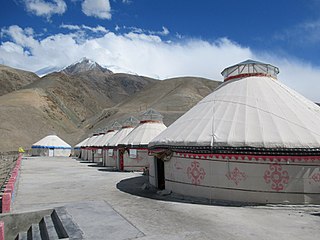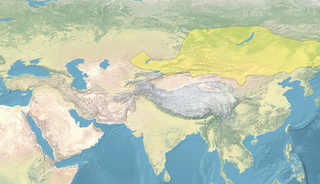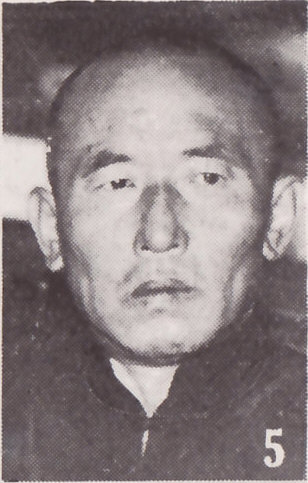A subdistrict ' is one of the smaller administrative divisions of China. It is a form of township-level division which is typically part of a larger urban area, as opposed to a discrete town surrounded by rural areas, or a rural township.

Taxkorgan Tajik Autonomous County is an autonomous county of Kashgar Prefecture, in western Xinjiang, China. The county seat is Tashkurgan. The county is the only Tajik autonomous county in China.

Kizilsu Kyrgyz Autonomous Prefecture is an autonomous prefecture in western Xinjiang, China, bordering Kyrgyzstan and Tajikistan. Its capital is Artux. The prefecture is home to 622,222 people and covers an area of 70,916 km2 (27,381 sq mi). Most Kyrgyz in China reside in Kizilsu; they make up a little over a quarter of the prefecture's population. The Uyghurs are the largest ethnic group in Kizilsu, consisting of nearly two-thirds of the population.

Gushi is a county of 1,023,857 people directly governed by Henan, People's Republic of China. It is administered by the prefecture-level city of Xinyang.
Wu Guoguang, is a Senior Research Scholar at Stanford University in his affiliation with Stanford Center on China’s Economy and Institutions (SCCEI), as SCCEI is a joint effort of Freeman Spogli Institute for International Studies (FSI) and Stanford Institute for Economic Policy Research (SIEPR) for “bridging the divide between cutting-edge empirical research on China’s economy and the policies guiding U.S.-China economic, trade and business practices.” He is concurrently a Senior Fellow on Chinese Politics at Center for China Analysis (CCA) of the Asia Society Policy Institute (ASPI), as CCA aims to “serve as a leading global center for policy-relevant, objective analysis of China’s politics, economy, and society, and its impact on the region and the world, in an era of growing strategic competition.”

The Xianbei state or Xianbei confederation was a nomadic empire which existed in modern-day Mongolia, Inner Mongolia, northern Xinjiang, Northeast China, Gansu, Buryatia, Zabaykalsky Krai, Irkutsk Oblast, Tuva, Altai Republic and eastern Kazakhstan from c. 93 to 234. Like most ancient peoples known through Chinese historiography, the ethnic makeup of the Xianbei is unclear, though they are believed to have been a Proto-Mongolic people.

Yu Pinqing was a politician and industrialist in the Republic of China. He was Supreme Member of the Southern Chahar Autonomous Government, later he was also appointed Vice-Chairman of the Mongolian United Autonomous Government and the Mongolian Autonomous Federation. He was born in Nangong, Zhili (Hebei).
Thomas Heberer is a Senior Professor of Chinese Politics & Society at the University Duisburg-Essen, Germany.

Luo Xianxiang (1890–1968) was a World War II Chinese general who served in the army of Chen Jiongming. He was a soldier, and at times, a regional government official. He established anti-corruption policies and conducted administrative and education reforms.
The Angkuic languages are spoken in Yunnan province, China and Shan State, Burma.
Angluo is a Southern Loloish language of Yunnan, China. Angluo is spoken in Jinping Miao, Yao, and Dai Autonomous County and Yuanyang County, Yunnan.
Yan Dakai was a People's Republic of China politician. He was born in Laoting County, Hebei. He was CPPCC Committee Chairman of his home province (1964–1967) and Tianjin (1979–1980). He was a delegate to the 4th National People's Congress and 5th National People's Congress and a member of the Central Advisory Commission.
Ni Xiance is a People's Republic of China politician. He was governor of Jiangxi (1985-1986).
Cigu Niru was a type of military unit of Qing China. It was one of the Nirus of the Qing army. The Cigu Niru consisted of ethnic Han soldiers who joined the Qing army in the early stage of its rise to power.

Tang Liang , also known as Tang Changxian (唐昌贤) or Tang Changmin (唐昌明), was a general in the People's Liberation Army of the People's Republic of China from Hunan.

Zhang Dinghuang (1895–1986), also known as Zhang Fengju was a Chinese-American antiquarian, Linguistics, literary critic, poet, and translator. He was born in Nanchang and an expert in antique manuscripts. Zhang was a supporting but key figure of the rich 20th century Chinese literary movements.

Yinchuan railway station is the main railway station of Yinchuan, the capital of China's Ningxia province. The station was opened in 1958. In 1988, a new station building was inaugurated, which was replaced in 2011 by a building on the opposite (eastern) side of the platforms.
Aisin Gioro Mianqing was Yongrong's fifth son and Qianlong Emperor's grandson. Mianqing was the third in Prince Shen peerage and the second holder of Prince Zhi of the Second Rank title.
Gao Chongmin was a Chinese male politician, who served as the vice chairperson of the Chinese People's Political Consultative Conference.








